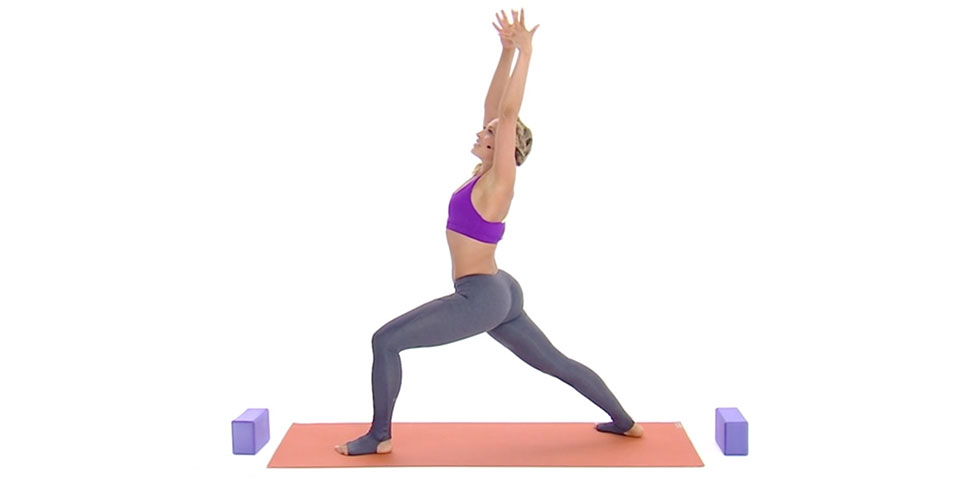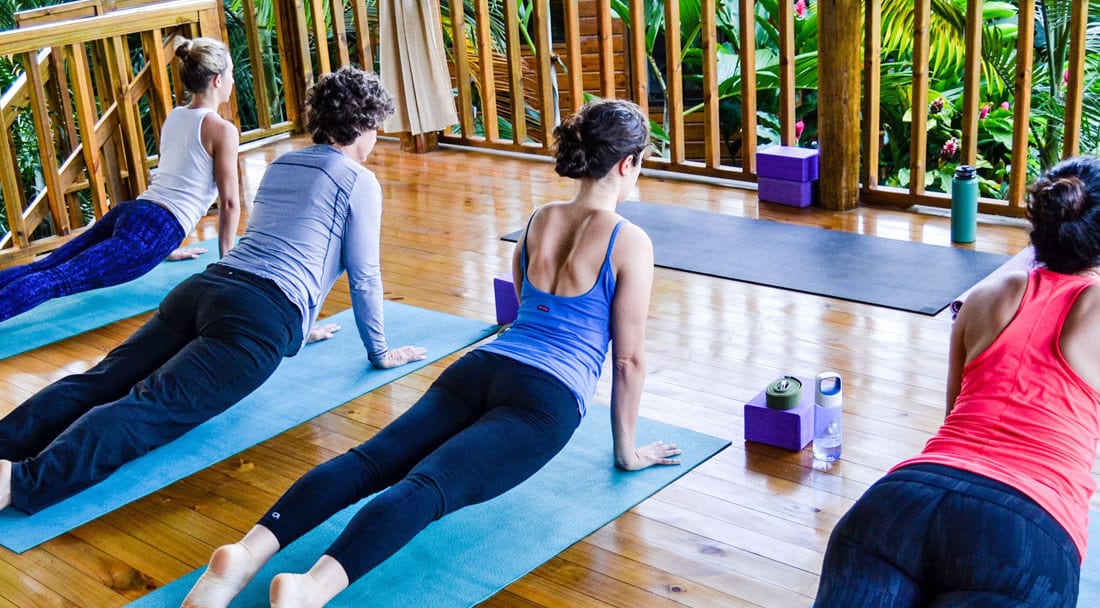
You can find the most recent yoga news here. This article will help you understand the benefits and drawbacks of yoga. This article will help explain why yoga is so beloved. Many people are beginning see the benefits of this practice. Recent research has shown that yoga can help reduce stress and depression. What's the best way to get started in yoga? These are some of the best ways to make yoga a regular part in your daily life.
First, stay informed about the latest developments and news in the yoga community. The Yoga Journal is an award winning platform dedicated to providing authoritative information about the practice. It provides readers with access to asana instruction, anatomy lessons, philosophy lessons, food and nutrition advice, news and trends, and even travel and natural beauty tips. This magazine contains everything you could need. It's even free. No advertising. The magazine's mission is to help readers find the best way to do yoga and live a healthy lifestyle.

Yoga Journal is an award-winning website that provides authoritative information about yoga and the lifestyle of yoga. YJ has a wealth of information that will benefit all levels of practitioners of yoga, including anatomy and philosophy lessons as well as instruction in asana. It also offers articles on health, travel and beauty. Their goal is to get to know their readers, no matter where they may be on the mat. They honor the 5,000-year-old practice through the latest news and trends.
Public schools are becoming increasingly popular for the benefits of yoga, and mindfulness are increasingly common. There are still some concerns. Yoga practice is no longer legal in many countries. And the changing of laws may have unintended consequences. For example, some health insurers are no longer providing rebates for 16 natural therapies. This has resulted to an increase of anti-abuse legislation, decreased natural therapy reimbursements, as well increased cases involving sexual harassation.
Another good source of yoga news is the Journal. The magazine has been a leading authority on yoga for forty years and is a great resource for all levels of practitioners. The magazine is widely read and has many writers from various backgrounds. While there are many other publications that cover the practice of yoga, a few are more reliable than others. However, YJ is the best place to begin if you want the most current and complete information about yoga.

The Department of Defense is leading efforts to combat the opioid epidemic. YJPs in the U.S. are practicing yoga and teaching it to the general public. A program was even initiated by the U.S. military to combat this problem. These studies have been complemented by the fact that more people are turning to yoga for its health benefits. Yoga can help with anxiety and insomnia, as well as other stress-related conditions.
FAQ
How does mental health affect our daily lives?
At some point in our lives, everyone is susceptible to mental illness. The main difference between those who suffer from mental illness and others is that they don't seek help for it. Talk to someone if something feels wrong. There are many options for dealing with anxiety, depression, stress, such as medication, therapy, exercise, diet and meditation.
What are the 5 ways to improve wellbeing?
Wellbeing refers to "the state or condition of being physically, mentally, spiritually, and socially well." Our well-being is affected by many factors, including family, work and health. Your first step towards improving your health and well-being is to identify what areas of your daily life are lacking. Next, take steps to improve these aspects.
Here are five easy ways to improve your wellbeing
-
Exercise – Physical activity increases endorphins that make us feel happier.
-
Sleep – A longer sleep time reduces stress and anxiety.
-
Nutrition - Eating healthy foods (such as fruits and vegetables) will boost your mood.
-
Meditation – Meditation reduces stress and anxiety.
-
Socialization - Spending quality time with friends and family makes us happy.
Why is mental health important for students?
Students need to feel good about their mental health in order to be able focus on school and succeed academically. If you don’t feel happy, you won’t do well in school. Students suffering from depression are more likely to miss class, which can lead them to get poor grades. This may result in dropping out of highschool and eventually college.
Talk to your family and teachers if depression is a problem. They will help you get the treatment you need.
It is important to remember that not all people with depression need medication. Talk therapy can be very effective for many people. A counselor is a great option for anyone who wants to seek help.
What effect does mental health have on my relationships?
Your mental health can have a profound impact on your daily life. It can affect your ability and willingness to work at all levels. Mental health issues can also make it challenging to form meaningful relationships.
It's easy for people to judge you when you have a mental illness. You might avoid social situations or feel unworthy because no one understands.
You must remember that people want you to be around them. They just need the ability to approach you.
If you are having difficulty connecting with others, talk to them about it. Ask them to help you.
How can I avoid mental health issues in the future?
It is not easy to prevent mental health problems. Here are some tips:
-
Don't drink alcohol. The effects of alcohol on moods can lead to depression.
-
Avoid using drugs. Avoid using drugs.
-
Sleep enough. Sleep deprivation can make you feel anxious and depressed.
-
Exercise regularly. Exercise releases endorphins in your body, which makes you happy.
-
Make sure you eat healthy foods. Junk food can make you feel lazy and unwell.
-
Spend quality time spending it with loved ones. Spending time with people you love can make you feel happier.
-
Have fun. Have fun and explore new things.
-
Social media can be exhausting. Social media sites can make you feel lonely and isolated.
-
Take care of yourself. Treat yourself nicely, even if you aren't feeling great.
-
Ask for help. Ask for help. Talking to a friend or family member can help.
-
It's okay for you to cry. The act of crying helps relieve stress and tension. It does not necessarily mean that something is wrong.
-
Be busy. Find something you like to do.
-
Good hygiene is essential. You can feel unattractive and unkempt if you don't maintain good hygiene.
-
Stay connected. Stay positive by connecting to others.
-
Learn how relax. Relaxation techniques such as meditation and yoga can help you to cope with stress.
-
Find meaning and purpose in what you do. Finding meaning in your hobbies or work can help you feel fulfilled.
-
Be present in the moment. You won't worry about the future if you are focusing on the moment.
-
Set goals. Set goals will motivate you to achieve them.
-
Do something nice for you. Your self-esteem can be raised by doing something kind for yourself.
-
Practice gratitude. Gratitude will help you appreciate all the positive things in your life.
-
Volunteer. Volunteering can be an enjoyable way to spend time and make a difference in the world.
-
Give back. Giving back to others is a way to feel fulfilled.
-
Watch out for warning signs. Don't be afraid to ask for help if your behavior changes.
Is mental well-being more important than working?
Everybody needs to be healthy, especially when they are working. It is important to take time to relax, whether you're at work or with friends.
You should speak to your boss if you are struggling with relaxation. They may be able offer suggestions to ease your stress.
It is also important to take care of your health. Eat well, exercise and get enough sleep are all important.
Statistics
- It means no drinking any alcoholic beverages and no taking any drugs that aren't 100% natural.
- In any given year, an estimated 18.1% (43.6 million) of U.S. adults ages 18 years or older suffered from any mental illness, and 4.2% (9.8 million) (healthypeople.gov)
- Similarly, for positive mental health, there is likely to be substantial agreement about some typical components (e.g., resilience to stress) 6, and controversy about more atypical components (e.g., career consolidation). (ncbi.nlm.nih.gov)
- More than 50% will be diagnosed with a mental illness or disorder at some point in their lifetime.3 (cdc.gov)
- More than 40 million adults in the United States have an anxiety disorder, but less than 37% of people seek mental health treatment for their symptoms. (talkspace.com)
External Links
How To
How to Improve Memory
Memory is one of those things that everyone wants to be able to remember better. But unfortunately, memory loss is something that happens to us all at some point in time. More than half of Americans aged 65 and older suffer from dementia.
No matter if you are dealing with Alzheimer's disease, dementia or any other form of cognitive decline, there are many options to improve your memory. These are the three steps that you can take today to improve your memory.
-
Eat More Fruits & Vegetables. Fruit and vegetables contain antioxidants, vitamins, minerals, fiber, and phytochemicals that boost brain function. They are also rich in essential nutrients that help prevent neurological diseases.
-
Get Enough Sleep. Low sleep quality has been linked both to memory loss, poor concentration, and memory loss. Make sure you get seven to eight hours of restful sleep each night.
-
Take a walk. Walking stimulates blood flow and improves memory. Plus, walking helps keep weight off your belly, so you look slimmer and healthier.